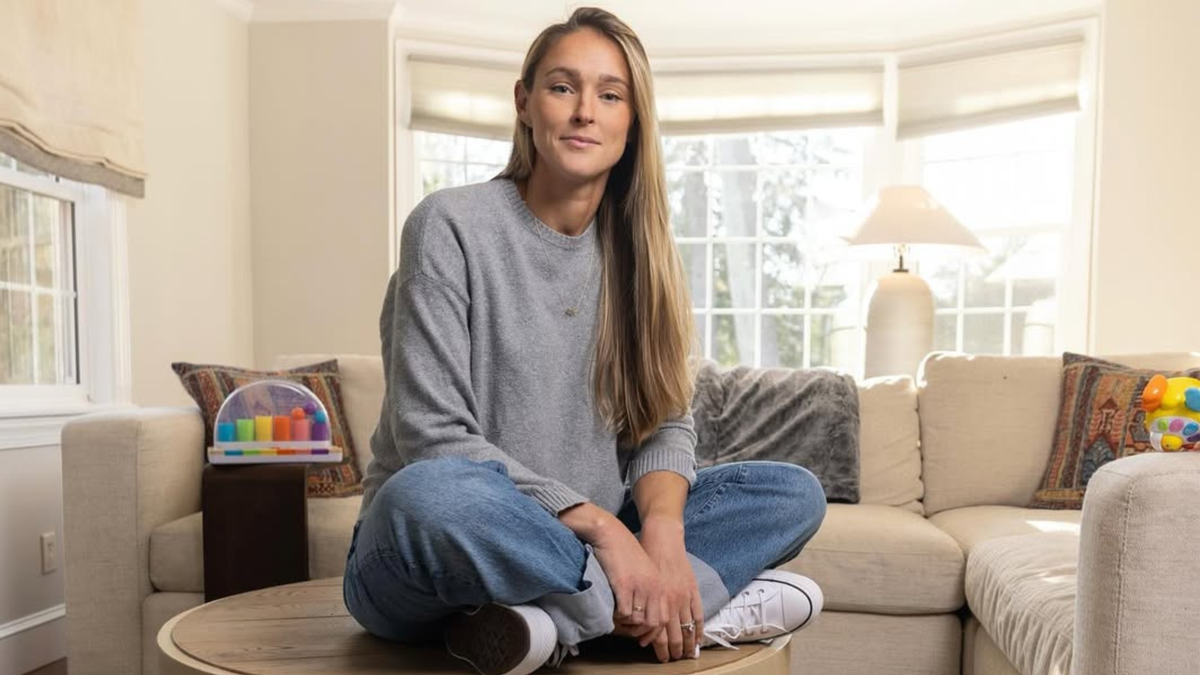
Imago
Image Credits: via @kykelce instagram

Imago
Image Credits: via @kykelce instagram
The Kelce household got a little louder this spring when Kylie and Jason Kelce welcomed their fourth daughter, Finnley “Finn” Anne, in March 2025. That joyful Instagram announcement showed Finn swaddled in blankets, with big sisters Wyatt, Elliotte, and Bennett grinning in their “big sister“ sweaters. It was a snapshot of a family embracing every chaotic, beautiful moment. Kylie Kelce was 33 years old when she gave birth to Finn. And that welcomed an unwanted debate in the society.
Watch What’s Trending Now!
Calling a pregnancy “geriatric“ just because someone is over 35? That label feels as outdated as flip phones. Mandy Moore, who welcomed her third baby at 40, knows exactly how ridiculous that sounds. On Kylie Kelce‘s weekly podcast “nglwithKylie,“ she shared, “So many of my friends are having kids later in life, whether it’s by choice or it’s by circumstance or biology,“ but the system treats them “as this anomaly that we’re like too old and we’re too complicated or high risk.”
In fact even as a younger mother, Kylie has been fighting a much bigger battle about how society views women’s health at every age. “We have fallen so short when it comes to women’s health in so many aspects,“ Kylie said on her podcast. “Part of that is the idea that it is one size fits all, that everyone is sort of gonna be put in this same track. And if you stray from that track at all, there’s very little correction because they just assume that you’re…oh well, if you’re not this on the track, you’re like severely off.”
ADVERTISEMENT
View this post on Instagram
The numbers tell a shocking story. “Funding of women’s health from 2013 to 2023: just 8% of the NIH funding,” said Mandy. Even more alarming? That percentage has actually shrunk. It dropped from 9.7% in 2013 to just 7.9% in 2023. This decline comes despite the NIH’s overall budget growing significantly. The NIH has kept the Office of Research on Women’s Health at the same $45 million budget since 2003, despite its critical mission. That stagnant sum fails to meet the growing need for research on conditions affecting half the population.
“How is that okay?” Mandy asks. “Women aren’t invisible. We’re doing such important things in the world, and our health matters.”
ADVERTISEMENT
Kylie and Mandy are rewriting the rules. No more outdated labels like “geriatric pregnancy.“ No more pretending all women’s bodies follow the same timeline. Just real support for real women’s lives – because when it comes to health, every woman’s experience matters. As more voices like theirs speak up, that long-overdue change might finally be coming. And if outdated medical terms weren’t enough, there’s another toxic trend Kylie Kelce is ready to dismantle – one that’s quietly haunted new moms for decades.
ADVERTISEMENT
“Bounce Back Culture” – the toxic expectation Kylie Kelce Wants Gone
Kylie Kelce isn’t holding back about the problematic phrase “bounce back after pregnancy.“ On her podcast, the mother of four called out how this expectation creates unrealistic pressure: “Every single person I’ve seen grow a human being has rebounded in their own time.“ She challenges even well-intentioned compliments, noting, “If I looked like this without just having a baby, would you call me tired? Because I am.“ For Kylie, the focus should shift entirely from appearance to genuine postpartum support.
The heart of the issue, Eagles‘ star’s wife, Kylie, explains, is the toxic comparison game. “The worst part is comparing yourself to either your pre-baby body or others,“ she says. “News flash—that version of you didn’t have kids.“ She’s particularly frustrated by the expectation to erase evidence of motherhood, like her permanent stretch marks: “Do I like them? No. Do I still look good? Hell yes.”
Top Stories
Michael Strahan Confirms Stance on Retirement from FOX While Announcing Future Plans

NFL Legend Charles Tillman Opens Up on Resigning From FBI After Unethical ICE Raids

Josh Allen Officially at Risk of Losing 21 Players as Bills Coach Quits Hours After Joe Brady Announcement

Terry Bradshaw Makes Personal Announcement Amid Calls for Retirement After On-Air Mistake on FOX

Dak Prescott Officially at Risk of Losing 15 Players After Jerry Jones Fires Three Cowboys Coaches

Kylie’s message cuts through the noise with refreshing honesty about postpartum realities. She rejects the idea that women should “fix“ their changed bodies, instead advocating for acceptance. “We shouldn’t even comment on a woman’s physical recovery journey,“ she insists. What truly matters is “overall well-being – physical, emotional, and psychological.”
ADVERTISEMENT
By challenging these outdated norms, Kylie is creating space for mothers to honor their unique journeys. Her viral takedown of “bounce back“ culture resonates because it rejects artificial timelines in favor of something radical: the truth that motherhood changes you, and that’s more than okay!
ADVERTISEMENT
ADVERTISEMENT
ADVERTISEMENT
.png)
.png)
.png)



